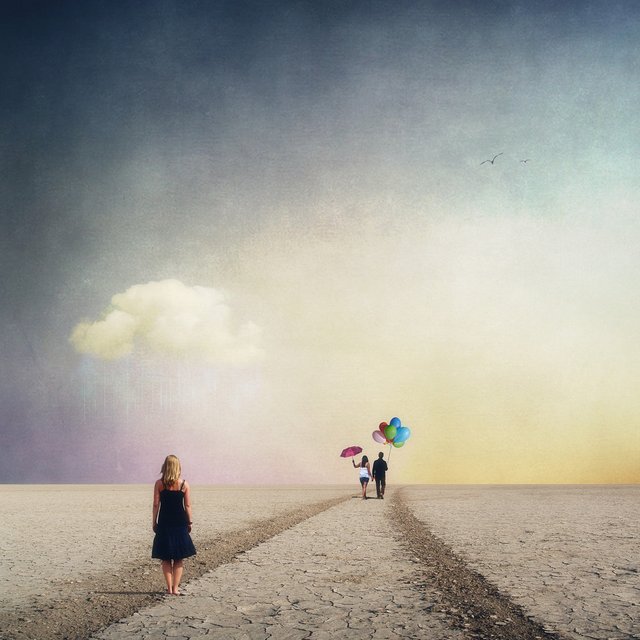Hard choices are often misunderstood. We assume that hard choices are so difficult, because we don’t know which choice has a better outcome or we may wonder if they are both equally bad or good. It’s a pity that we are so afraid of hard choices because they activate a hidden power in us.

Let me explain...
We make choices all day. It can begin in the morning while you’re deciding what you want to eat for breakfast. You can have cereals or a donut. You might think that the cereals are the healthier option but the donut tastes much nicer - or you could think that both choices are equally good because they will both fill you up quickly. We often think about arguments for and against certain scenarios.
“I wish I knew how it would feel to be an artist.”
“I wish I knew if I want to live in the country or city”
When we face hard choices we bang our head against the wall and come up with several reasons for and against one choice or the other. There are a lot of people out there who will take the safest option after they went through the reasons. It’s a mistake to think that one alternative is better than the other but we want it to be true.
Hard choices are not hard because of us. They are hard because there is no better option.
Being an artist or an investment banker can both be fulfilling jobs depending on what you want to do in your career. There is no right or wrong, none is better than the other. You can come up with so many reasons that they will never outweigh each other, because you keep adding more to your list.
We could argue that one should think about choices to be of equal value - like flipping a coin... Wouldn’t that be nice?
The problem is that values like justice, beauty, family or happiness can’t be compared with metrics. There is no scientific system behind these values because all these options are subjective for each and every one of us. We shouldn’t assume that the world of choices works in the same way as mathematical logic or numbers.
If you ask someone to define the weight of two pieces of luggage. There can only be three options. Heavier than the other, equally heavy, or less heavy.
Personal choices there are more diverse; alternatives can be on par. They can be in the same league of value but being very different in the kind of value. That’s the reason why we struggle with making hard choices.
Choices can’t be compared with metrics because we don’t measure them in the same way.
But here is the good thing about choices. Each of us has the power to create reasons. If there is a best alternative you’ll always choose the best, isn't it? If we were to live in a world where everything is crystal clear then we would have a life of easy choices.
As humans we are pretty smart in creating reasons for ourselves to choose that hobby, buy that house or choose that career. By creating reasons we lead ourselves to choices.

We can do something really remarkable with choices because we can put ourselves behind one choice and create reasons for it.
As it this happens, we become the authors of our own life. We shouldn't bang our head against the wall. We should look for reasons in ourselves because the hard choices that we decide are very much up to us.
Sometimes we are drifters. Drifters allow the world to write the story of their life. These are people who are afraid to choose their option and decide in favor of a safer alternative. They will make up their bad reasons afterwards.
I believe hard choices are precious opportunities to celebrate! What is so special about human beings. We have the power to create reasons for ourselves and create who we really are. Nobody is stopping us from making this move. We only stop ourselves.
The concept of hard choices can be learned and we can start learning by making easy choices first: By deciding something and creating good reasons for it.
Here are some questions that you can ask yourself to find a good way of creating these reasons for yourself.
1. If I don’t do this now, will I regret it?
2. What am I afraid of?
3. What does my heart say?
4. Who am I really doing this for?
By going through this format you should make sure that you limit the information you take in. The reasons for your choice should come from you. It’s your choice, not your dad’s, your mum’s or anyone else's.
The human mind hates uncertainty.
Risk is measurable uncertainty. Uncertainty is unmeasurable risk.
Uncertainty implies volatility and danger. When we notice information is missing our brain raises a red flag and makes us search for more information. It’s in our nature to expand our horizon and weigh out options but it’s up to you to locate this information and use it in a positive way.
Most decisions we make don’t matter as much as we think they do. Try to keep the information that you consume to a minimum. Some choices are also revertible and it doesn’t mean you’re stuck with your choice forever. Are you wondering if you should move into another city/country? There is nothing stopping you from moving and eventually coming back.
I flip a coin ! Mostly because while the coin is still in the air, the best choice is the one you end up wishing for it before the coin drops.
Downvoting a post can decrease pending rewards and make it less visible. Common reasons:
Submit
Nice one!
Downvoting a post can decrease pending rewards and make it less visible. Common reasons:
Submit
Haha I do the exact same thing, but for a different reason, to see if I feel regret or relief :)
Downvoting a post can decrease pending rewards and make it less visible. Common reasons:
Submit
I would love to think that positive and have the strength to not take the easy option
Downvoting a post can decrease pending rewards and make it less visible. Common reasons:
Submit
Thank you for the article. Everything is painted in detail!
Downvoting a post can decrease pending rewards and make it less visible. Common reasons:
Submit
You're welcome :)
Downvoting a post can decrease pending rewards and make it less visible. Common reasons:
Submit
@inboundinken I like the perspective you share on handling choices, uncertainty and the creation of our own reasons.
It is encouraging and hopefully more people will take action to improve their life and the world around them.
Downvoting a post can decrease pending rewards and make it less visible. Common reasons:
Submit
Thank you! It's certainly not easy to adapt but trying is the best we can all do. Sometimes a little encouragement helps too :)
Downvoting a post can decrease pending rewards and make it less visible. Common reasons:
Submit
Wow! I really love this topic, @inboundinken, so thank you for starting it :)
I fully agree that we write our destiny with our own decisions. And it's not just a mind game. As soon as I say or write on the paper the sentence (for example) "I decided to start to learn Chinese", my deeper nature, which is usually called the subconscious mind, immediately appropriates the energy. And I feel an emotional lift. Whatever decision I took, the subconscious always responds to it either by the rise of energy, or the opposite - by decline. One who engaged in self-development knows how it works.
And as I see it, there are only two modes of our subconscious. Either the subconscious mind expects reality will change, or it starts to change the reality itself. As soon as a person says a complaint, the subconscious includes the "standby mode". Now his entire inner world is just waiting for reality to change. And if you're in that state, you always explain yourself, why "it is absolutly impossible".
As one great man said, "Impossible is a word from the lexicon of fools." Everything is possible. Even the so called "impossible" things. But the obstacle in only one - our complaints. If I take responsibility for my life, I make decisions and act. And I may be mistaken, but at least I have a chance to reach my cherished goal.
When I personally need to make a difficult decision, I primarily listen to my heart, listen to my feelings. Then I try to think rationally, that is, trying to see the consequences of this decision. And in general, I ask myself the same questions you wrote in the post. In addition, I turn for advice to those whose life is an example for me to follow.
Whatever the consequences of my decisions, I believe that each of us is directed from above. So even if I'm "wrong", I believe that this mistake would not be fatal. And that ultimately, it is better to act and be wrong than to sit idle and think that you're safe.
Downvoting a post can decrease pending rewards and make it less visible. Common reasons:
Submit